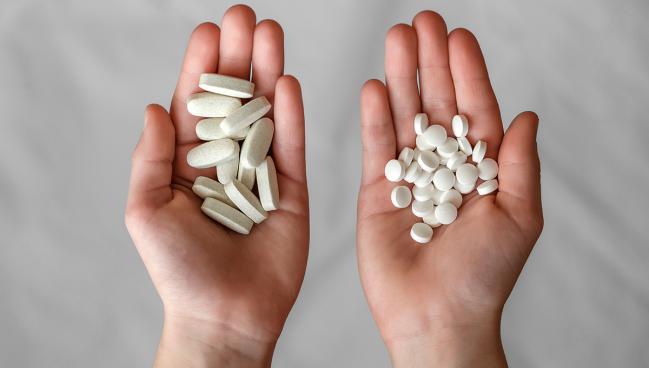Another OPTION? Indobufen Noninferior to Aspirin Following Successful PCI
The 1-year outcomes, which experts say need to be reproduced at other sites, were driven by a reduction in BARC 2 bleeding.

CHICAGO, IL—Replacing aspirin with indobufen in the dual antiplatelet (DAPT) regimen for patients without elevated cardiac troponin after successful drug-eluting stent implantation results in a lower risk of 1-year net clinical outcomes, a difference driven by nonserious bleeding events, according to the randomized OPTION trial.
While most patients can tolerate aspirin, hypersensitivity and allergy in some leave room for other options. Indobufen, a reversible platelet cyclooxygenase inhibitor, has previously been shown to cause less gastrointestinal injury, although its mechanism of action requires it to be taken more frequently than aspirin, usually twice daily.
Presenting the data on Saturday during a late breaking clinical trial session at the American Heart Association (AHA) 2022 Scientific Sessions, Junbo Ge, MD (Zhongshan Hospital, Shanghai, China), said the OPTION trial showed “feasibility” of replacing aspirin with indobufen and also potentially opens the door to other options for patients at high bleeding risk.
“Since the first publication on indobufen on 1979, there was a peak in manuscripts in the 1990s, but I’m sure there will be some kind of revival after the OPTION trial,” said Stefanie Schüpke, MD (German Heart Centre Munich), who discussed the findings following their presentation.
The trial was simultaneously published in Circulation.
Indobufen Noninferior
For the OPTION trial, Hongyi Wu, MD (Zhongshan Hospital), Ge, and colleagues included 4,551 patients (mean age 61 years; 65% male) with negative cardiac troponin who underwent successful PCI with DES for either stable CAD (43.6%) or unstable angina (56.4%) at one of 103 Chinese centers between January 2018 and October 2020. Patients were randomized to 12 months of DAPT with clopidogrel 75 mg daily plus either indobufen 100 mg twice daily (n = 2,258) or aspirin 100 mg daily (n = 2,293).
At 1 year, the risk of composite primary outcome of cardiovascular death, nonfatal MI, ischemic stroke, definite or probable stent thrombosis, or BARC type 2, 3, or 5 bleeding was lower for those receiving indobufen compared with aspirin (4.47% vs 6.11%; HR 0.73; 95% CI 0.56-0.94; P < 0.001 for noninferiority). These benefits were seen across all prespecified subgroups.
Outcomes were comparable for the secondary efficacy endpoint of cardiovascular death, nonfatal MI, ischemic stroke, and definite or probable stent thrombosis between the study and control groups (1.51% vs 1.40%; HR 1.08; 95% CI 0.67-1.75). However, the secondary safety endpoint of BARC 2, 3, or 5 bleeding showed an advantage with indobufen (2.97% vs 4.71%; HR 0.63; 95% CI 0.46-0.85), thanks to a significant difference in BARC 2 bleeding (1.68% vs 3.49%; P < 0.001).
More Study, Cost Analysis Needed
“The authors should be congratulated for performing the largest randomized comparison of indobufen and aspirin,” Schüpke said, acknowledging that the trial was both open label and had event rates that “were somewhat lower than expected.”
She noted that the DAPT duration used in this study is longer than what is currently recommended for elective PCI. “If you look at the curves, you can see that the benefit for indobufen starts at about 6 weeks after PCI, the time point around which removal of aspirin is becoming standard after elective PCI,” Schüpke said. Because of that, these results might have generalizability issues.
Also, because randomization in OPTION happened after successful PCI, it’s likely that a “high” number patients in both groups received periprocedural aspirin, she pointed out.
Looking at the overall benefit observed in the trial, “even though it was impressive, it was mostly driven from bleeding,” said Dipti Itchhaporia, MD (Hoag Memorial Hospital Presbyterian, Newport Beach, CA), immediate past president of the American College of Cardiology, who commented on the findings for TCTMD. “Can you achieve that same thing by doing shorter dual antiplatelet therapy?”
She also said she would like to see the OPTION results reproduced at other centers. Price is going to be an issue, as well, especially as clinicians have become more aware of medication costs and aspirin is likely cheaper. Still, Itchhaporia acknowledged that indobufen might appeal for certain patients, especially those at high bleeding risk.
“Based on the results of the OPTION trial, indobufen is an alternative to aspirin in biomarker negative patients undergoing PCI with drug-eluting stents and treated with clopidogrel, particularly in cases of aspirin allergy or intolerance,” Schüpke concluded. “Yet the additional value of indobufen compared to placebo after the periprocedural use of aspirin remains unclear.”
Yael L. Maxwell is Senior Medical Journalist for TCTMD and Section Editor of TCTMD's Fellows Forum. She served as the inaugural…
Read Full BioSources
Wu H, Xu W, Zhao X, et al. Indobufen or aspirin on top of clopidogrel after coronary drug-eluting stent implantation (OPTION): a randomized, open-label, endpoint-blinded, non-inferiority trial. Circulation. 2022;Epub ahead of print.
Disclosures
- OPTION was sponsored by Hangzhou Zhongmei Huadong Pharmaceutical Company.
- Ge reports receiving support from the Shanghai Clinical Research Center for Interventional Medicine and Clinical Research Special Fund of Zhongshan Hospital Fudan University.
- Schüpke reports receiving support from the DZHK (German Center for Cardiovascular Research) for the ISAR-REACT 5 trial.
- Itchhaporia reports no relevant conflicts of interest.




Comments